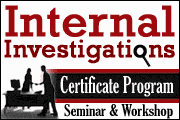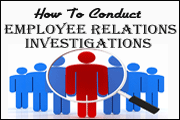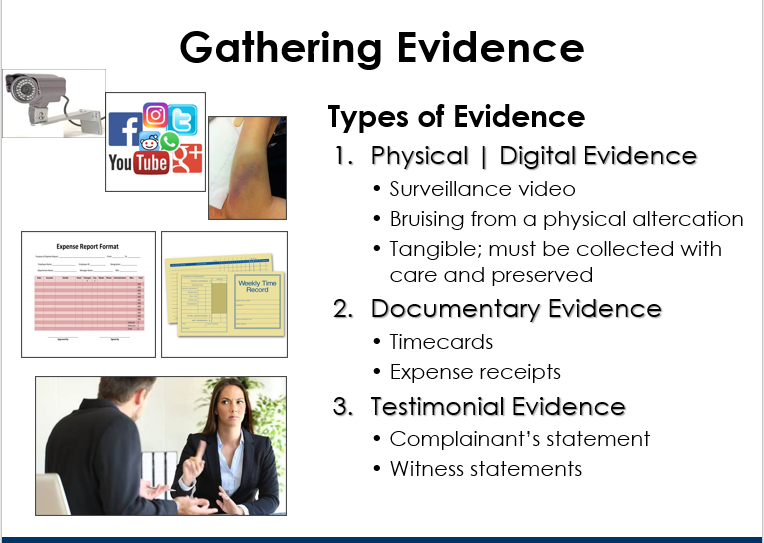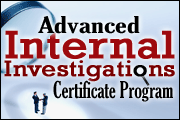Internal Investigations Training
About Internal Investigations - And How They Work
What Is An Internal or Workplace Investigation?An "internal" or "workplace" investigation is a formal inquiry regarding allegations of wrongdoing to determine whether laws or corporate policies have been violated.
What Are Some Incidents That Can Trigger an Internal Investigation?You may need to conduct an internal investigation if you receive regulatory requests for information, whistleblower claims, or audit reports. Other incidents that may require an internal investigation include reports of:

- Discrimination
- Misconduct
- Harassment
- Theft
- Fraud
- Violations of workplace policy or employment law
- Cybersecurity risks and threats
- Claims of Retaliation
Why Is Internal Investigation Training Important?Internal investigation training gives you the tools, skills, and knowledge to conduct proper investigations. It paves the way for remedial actions that keep your organization compliant while addressing employee issues.
When performed appropriately, internal investigations can protect your organization and minimize risks while promoting employee satisfaction. They can help you ensure operations conform with your industry's rules and regulations by revealing opportunities for improvement.
What Is Involved With An Internal Investigation?
What Are Some Steps And Best Practices In Conducting An Internal Investigation?Best Practices for an internal investigation typically include:
- Knowing The Law:
Whether you are looking at theft, retaliation, or harassment, employers must know federal and state law and the legal obligations that require them to conduct internal investigations long before the need for an internal investigation arises.
- Having A Clear Objective:

Define the purpose and scope of the investigation. This could be to uncover misconduct, violations of policies or laws, or to address complaints.
- HavingAn Action Plan:
Develop a plan to address any issues identified during the investigation, which may include disciplinary action, policy changes, training, or other measures.
- Using A Qualified Investigator:
Assign someone with the necessary skills and independence to lead the investigation. This could be someone from within the organization, a legal team, or an external investigator.
- Evidence Collection:
Gather all relevant evidence, which may include documents, emails, electronic records, physical evidence, and witness statements.
- Interviewing:
Conduct thorough witness interviews with relevant parties, including any individuals involved in the matter under investigation.
- Impartiality and Objectivity:
Ensure that the investigation - especially with witness interviews - is conducted impartially and objectively, without bias or preconceived notions.

- Analysis:
Review and analyze the evidence collected to determine the facts of the matter and assess any potential violations of policies or laws.
- Reporting:
Prepare a comprehensive report outlining the findings of the investigation, including any conclusions reached and recommendations for corrective action.
- Communication:
Keep stakeholders informed throughout the investigation process, while also respecting the need for confidentiality.
- Follow-Up:
Monitor the implementation of any recommended actions and conduct follow-up reviews as necessary to ensure that the issues identified have been effectively addressed.
- Legal Compliance:
Ensure that the investigation complies with all relevant laws, regulations, and company policies.
- Confidentiality:
Maintain confidentiality to the extent possible to protect the integrity of the investigation and the privacy of those involved.
- Documentation:
Be sure to keep detailed records of all actions taken, interviews conducted, evidence gathered, and decisions made throughout the investigation process.
By adhering to these best practices for internal investigations, organizations can conduct thorough and effective investigations that help maintain integrity, accountability, and compliance.
 What Are the Risks Involved With An Internal Investigation?
What Are the Risks Involved With An Internal Investigation?Risks you may encounter when conducting an internal investigation include:
- Hostile or violent employees
- Retaliation lawsuits
- State or federal repercussions from broken laws
- Effects on your workforce
- With proper training and certification, you can mitigate these risks and improve the outcomes of your internal investigation for your organization and employees.
What Are the Pitfalls of An Internal Investigation?Pitfalls of an internal investigation tend to come from poor investigation handling. When conducted improperly, investigations can lead companies to experience negative employee reactions and loss of profits and reputation. With appropriate training, experience, and certification, internal investigation leaders can conduct investigations that minimize risks, maintain employee satisfaction, and preserve reputation.
How Our Internal Investigations Training Programs Can Benefit Your Organization
HRTrainingCenter.com has provided internal investigations training courses for over 20 years. We know what tools and resources HR professionals need to excel within their roles and advance their careers.
When you participate in our internal investigation courses, you can trust our knowledgeable instructors to provide the resources and comfortable learning environment you need to master the material and apply concepts within your own organization. We offer multiple training modalities to make it easy for you to fit this essential HR training into your busy schedule.
Our Ratings: 4.87 - 646 reviews | Read Some Testimonials | View A Featured Trainer Get started on your training today. After all, is the time to learn how to do an internal investigation when you are suddenly faced with having to do one?
Best-Selling Training Courses:
Instructor-Led: Virtual/In-Person Seminars
Instructor-Led: Webinars
Find Seminars, Webinars, And Online Training In Your Area


 770-410-1219
770-410-1219









